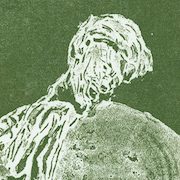Andy Sharp, managing director of English Heretic, once more wields his intriguing and inspiring creative praxis to bring us Wish You Were Heretic, the 14th postcard from his recently expanded underworld organisation.
The consistent yet unusual methodology Sharp uses to guide English Heretic’s recordings is influenced by the way author and poet Robert Graves handled early Celtic literature. Graves believed that “Christian legend, dogma and ritual are the refinement of a great body of primitive and even barbarous beliefs,” and sought to demonstrate this in The White Goddess, his controversial, semi-fictional study of how the relationships between ancient poetry, magic and ritual conspire in myth-making. But instead of ancient literature, Sharp selects choice cuts of 20th Century counter-culture, particularly folk horror cinema, and mashes them up with his own in-depth, idiosyncratic research to form contemporary myths, more often of an occult nature. Adding annotations from the likes of Lovecraft, MR James, Ballard and Burroughs for good measure, the result is a resonant, cross-fertilised, contextual score of sorts that suggests hidden, psychogeographical effects from the recent past are at large.
For Wish You Were Heretic, the complex, heady contexts are set out in a booklet comprising two essays. The first places a couple of related, grisly Play For Today television dramas from the seventies (Robin Redbreast and A Photograph), alongside mysterious murders from the real world that occurred near to where each was filmed. The second joins the dots between a non sequitur from Graves’ The White Goddess and MR James’ classic ghost story Oh, Whistle, and I’ll Come to You, My Lad interwoven with references to Ballard’s Vermillion Sands, Burroughs Cities of the Red Night and The Exorcist, of which Sharp self-deprecatingly reveals “the unearthing of Pazuzu [is] one of my favourite pieces of cinema and a scene I would like to live in and maybe I do: a hyperventilating amateur archaeologist surrounded by omens.”
The presentation and tone is firmly rooted in the underground press that evolved in parallel to the original Industrial artists of the early eighties, such as Amok, Rapid Eye, Feral House and Re/Search, sharing otherwise hidden knowledge on magick, psychopaths and cult religions in a pre-internet world. But instead of opting for Industrial’s abstruse Futurist noise to sonify his arcana, Sharp has developed a much more accessible mode of folk-infused post-rock. This has never been more potent than on this latest release, which sees English Heretic expand from a largely solo affair to a fully-fledged band, blending a doom-heavy rhythm section of Paul Robertson (of Black Magician) on bass and Phil Mason on drums, with the dual synths of Dean Brannagan (of Gruppen) .and Hannah Gilbert.
It opens with ‘Rite Of Saint Secaire’, a reference to a black mass at Ostia that parodies the Eucharist, as we’re introduced to the precise enunciations of English Heretic’s new vocalist Ian Taylor – part voice over artist, part evangelist – as a tolling bass, buzzing psyche guitar and synth slabs the weight of a church organ parade under moonlit howls. It ends with a sample of a female singing the traditional English folk song ‘Bushes and Briars’ as if to ground the hitherto ethereal energies.
The aforementioned web of contexts steer the rest of the album, like on ‘The Dark Glass’ which begins with sampled dialogue from Robin Redbreast (“What good would a women’s blood be to the land?”) as romantic synth strings swell. They lead into a tender narration of AE Housmann’s poem ‘On the Idle Hill of Summer’ before solemn drums and a pagan violin rouse Taylor’s voice to the intensity of a preacher intoxicated on his own faith. The climaxing occult rocker reminds of Aleph on Hallucinatory Mountain, Current 93’s own forceful foray into doom metal territory from 2009.
Penultimate track, ‘Sand’, briefly breaks the mould with a kind of folksy electronica, perhaps strategically deployed as the calm before the storm, for the grand finale of ‘Who Is It Who Is Coming?’ follows with a steady ritual rhythm building to a whirlpool of screaming rock guitar and psychedelic synth chaos.
English Heretic’s music adds large swathes of colour to what would otherwise be curious passages of black text on a white page. The colour brings Sharp’s wayward hypotheses to life, turning them into a kind of contemporary Grand Guignol theatre, an ideal format for promulgating myths new and old.
Sharp trained as a neuroscientist and on a previous release proposed that “our psyche is an assemblage of memories of physical and emotional experiences… stored in the form of complex constellations… is it possible that culture, literature and personal epiphany find their double in terrestrial trauma?” His fascinating enquiries into this paradigm are almost Tarantino-esque in the way it laps up exploitation movies and spits them back out as twisted, idiosyncratic musical homage. But in the thoroughness of his research and the power of English Heretic’s words and music there’s also an uneasy feeling that Sharp’s conflations may have a firm belief in their occult implications that makes the experience for the listener all the more thrilling.


